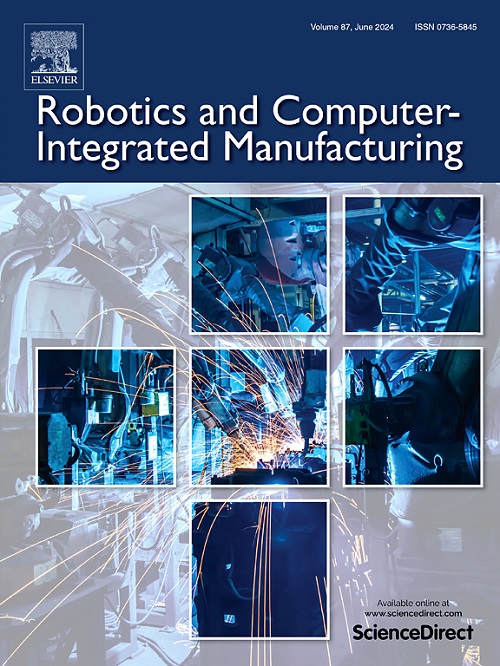一种基于强化学习的元启发式方法解决带有任务取消的云制造动态调度问题
IF 11.4
1区 计算机科学
Q1 COMPUTER SCIENCE, INTERDISCIPLINARY APPLICATIONS
引用次数: 0
摘要
云制造(CMg)的最新发展突出了在分布式和动态环境中高效任务调度和资源分配的需求。据我们所知,现有的研究没有考虑到动态事件,如任务取消,这可能导致资源效率低下,扰乱初始计划。为了解决这一问题,本文引入了一种考虑任务取消的动态任务调度和服务分配(DTSSA)问题。该模型考虑了物流时间和不同的到达时间,它们直接影响任务的完成时间。在此基础上,提出了一种基于强化学习的遗传算法来解决模型的np -硬度问题,并在合理的时间内解决中、大规模问题。该算法采用Q-learning算法动态选择搜索算子,并采用ε-greedy方法提高搜索能力。为此,首先采用田口法对元启发式算法的参数进行了调优。使用文献中的30个基准实例以及受现有研究启发的示例案例对所提出的算法进行了评估。其次,利用GAMS软件实现小尺度算例,对数学模型进行了评估。然后,利用统计检验和几个不同规模的检验问题,将这些算法与一些知名的元启发式算法以及最近发展起来的元启发式算法进行了比较。此外,结果表明,重新调度问题提供了高达8.7%的解决方案比初始调度平均。最后,模型的敏感性分析表明,加工时间和物流时间越长,调度和重调度的最大完成时间越长。本文章由计算机程序翻译,如有差异,请以英文原文为准。
A reinforcement learning-based metaheuristic approach to address the dynamic scheduling problem in cloud manufacturing with task cancellation
Recent developments in cloud manufacturing (CMg) have highlighted the need for efficient task scheduling and resource allocation in distributed and dynamic environments. To the best of our knowledge, existing studies have not considered dynamic events such as task cancellation, which can lead to resource inefficiencies and disrupt the initial schedule. To address this gap, this paper introduces a novel dynamic task scheduling and service allocation (DTSSA) problem in CMg that considers task cancellation. The proposed model considers logistics time and different arrival times, which directly impact the tasks’ completion times. Furthermore, a reinforcement learning-based genetic algorithm is developed to tackle the NP-hardness of the model and solve medium- and large-scale problems in a reasonable time. The algorithm dynamically selects search operators using the Q-learning algorithm and applies a ε -greedy approach to improve search capabilities. In this regard, first, the metaheuristic algorithms’ parameters are tuned by the Taguchi method. The proposed algorithms were evaluated using 30 benchmark instances from the literature, as well as example cases inspired by existing studies. Next, the mathematical model is evaluated by implementing small-scale examples using GAMS software. Then, the algorithms are compared with not only some well-known metaheuristic algorithms but also recently developed metaheuristic algorithms using statistical tests and several test problems of different sizes. Additionally, results show that the rescheduling problem provides up to 8.7% better solutions on average than the initial schedule. Lastly, the model's sensitivity analysis reveals that the longer the processing time and logistic time, the longer the maximum completion time for scheduling and rescheduling.
求助全文
通过发布文献求助,成功后即可免费获取论文全文。
去求助
来源期刊
CiteScore
24.10
自引率
13.50%
发文量
160
审稿时长
50 days
期刊介绍:
The journal, Robotics and Computer-Integrated Manufacturing, focuses on sharing research applications that contribute to the development of new or enhanced robotics, manufacturing technologies, and innovative manufacturing strategies that are relevant to industry. Papers that combine theory and experimental validation are preferred, while review papers on current robotics and manufacturing issues are also considered. However, papers on traditional machining processes, modeling and simulation, supply chain management, and resource optimization are generally not within the scope of the journal, as there are more appropriate journals for these topics. Similarly, papers that are overly theoretical or mathematical will be directed to other suitable journals. The journal welcomes original papers in areas such as industrial robotics, human-robot collaboration in manufacturing, cloud-based manufacturing, cyber-physical production systems, big data analytics in manufacturing, smart mechatronics, machine learning, adaptive and sustainable manufacturing, and other fields involving unique manufacturing technologies.

 求助内容:
求助内容: 应助结果提醒方式:
应助结果提醒方式:


